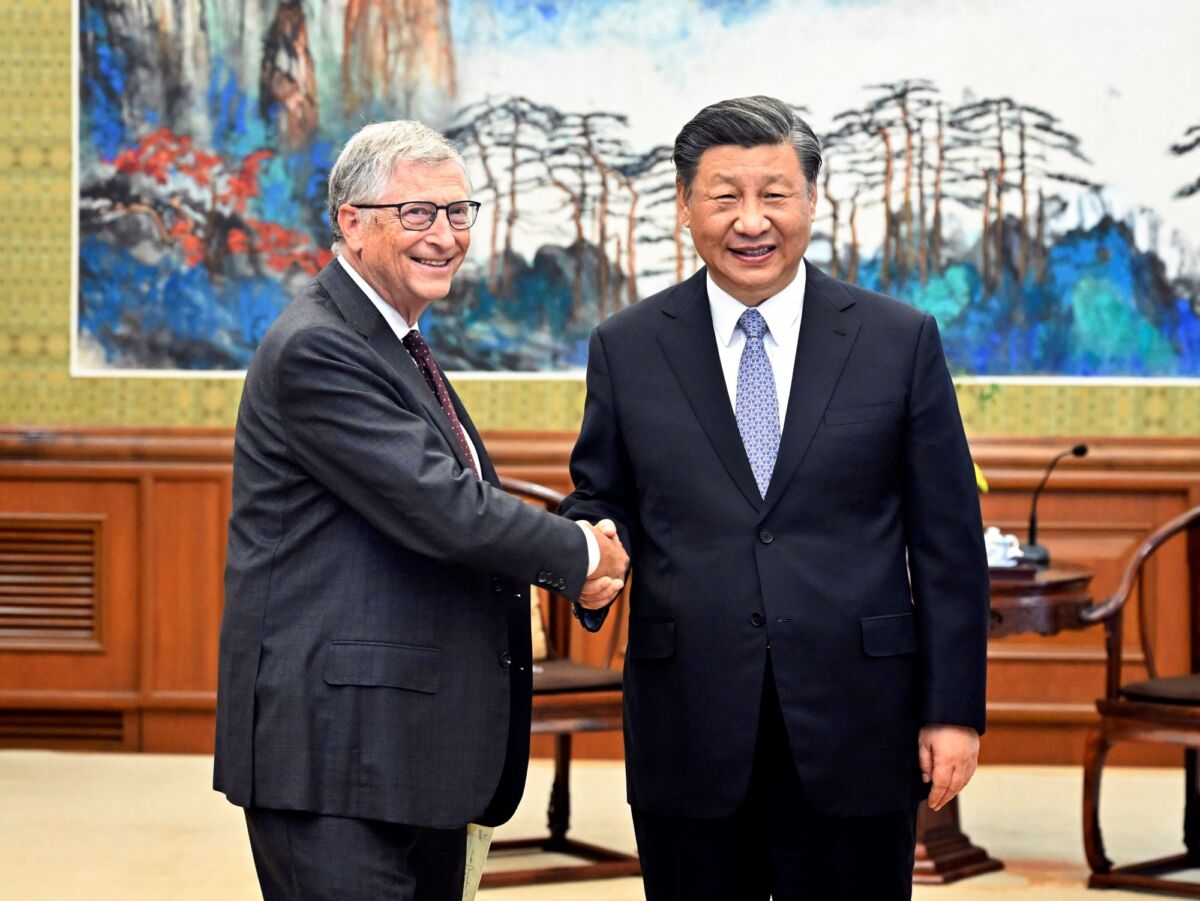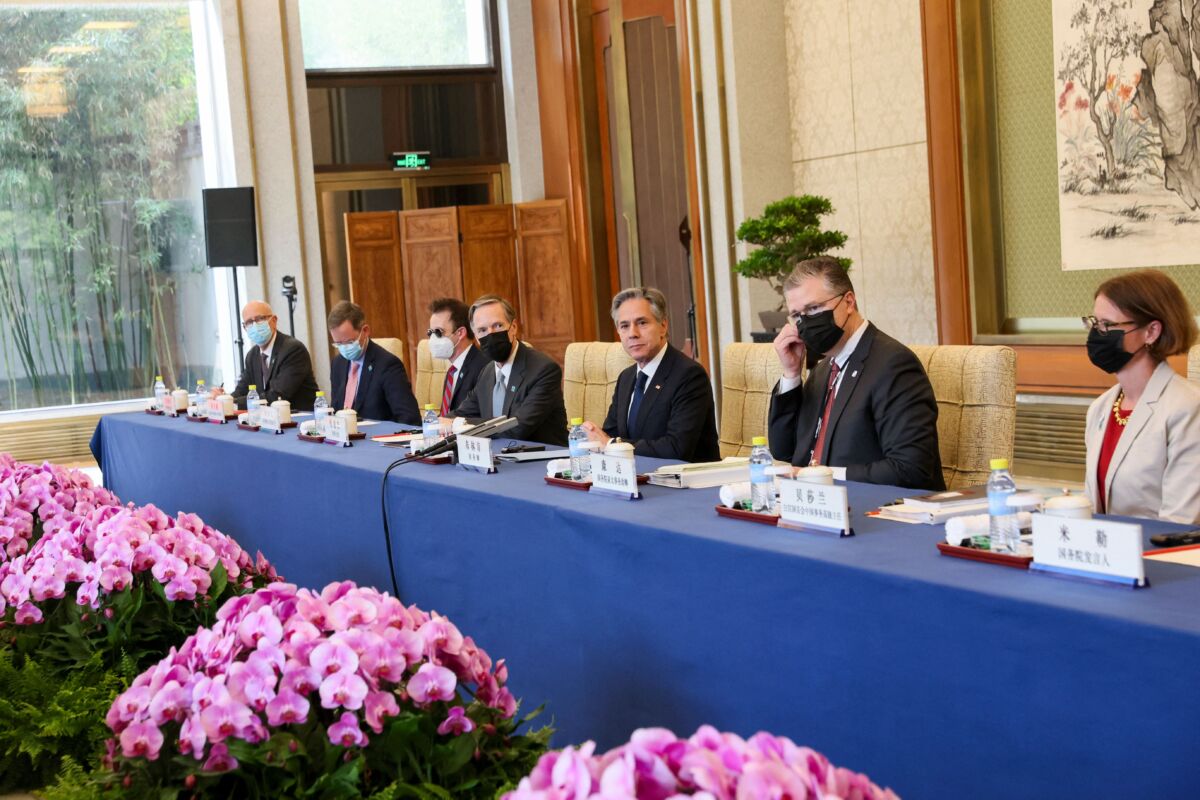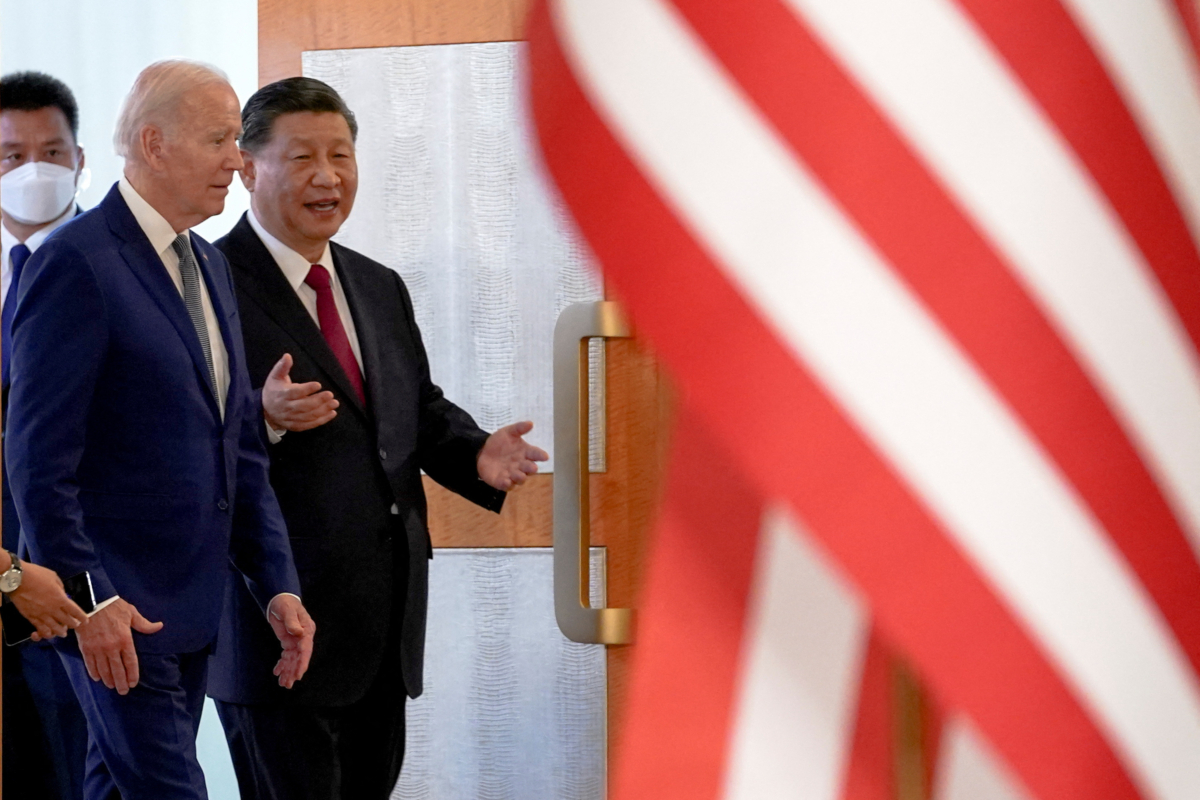U.S. Secretary of State Antony Blinken on June 17 had a “candid” talk with Chinese foreign minister Qin Gang in Beijing, the two sides said, at the start of a two-day visit that has drawn criticism as experts and U.S. lawmakers say that visiting China was a mistake.
Blinken, the highest-level U.S. official to set foot in China since President Joe Biden took office in 2021, is the first secretary of state to visit since 2018, when his predecessor, Mike Pompeo, visited China for one day.
Qin greeted Blinken at Diaoyutai State Guest House in Beijing. The two chatted briefly and shook hands before heading into a meeting room. Neither of the diplomats made comments in front of reporters.
Blinken’s trip to Beijing marks the latest in a string of efforts by Washington to engage with Beijing; the communist regime has largely resisted bilateral exchanges on the military level.
During their five and half hours meeting, Bliken “emphasized the importance of diplomacy and maintaining open channels of communication across the full range of issues to reduce the risk of misperception and miscalculation,” Matt Miller, spokesperson of the Department of the State, said in a readout released after the meeting.
“The Secretary raised a number of issues of concern,” Miller said without specifying.
Bliken invited Qin to visit Washington, and “they agreed to schedule a reciprocal visit at a mutually suitable time,” Miller said.
Both U.S. and China officials described their meetings as “candid” and “constructive” talks, though outside observers signaled low expectations for any major breakthroughs even ahead of their talks.
The trip won’t “produce any phased agreement, or specific results,” because the Chinese Communist Party (CCP) is set up such that all decisions ultimately come from Chinese leader Xi Jinping, Chen Lijian, a U.S.-based China commentator, told The Epoch Times on June 15.
Xi, meanwhile, has stepped up his efforts to prepare the party’s military wing and China’s population for conflict. On May 30, Xi told officials of the party’s national security commission that they “must be prepared for worst-case and extreme scenarios, and be ready to withstand the major test of high winds, choppy waters, and even dangerous storms.”

Xi had repeatedly vowed to annex Taiwan, a self-ruled island the CCP viewed as its own territory, and hasn’t ruled out a war to achieve that goal. In recent years, Taiwan has been bearing escalated military harassment from Beijing, which continues to send warplanes flying near the island on a regular basis. In 2022, China sent 1,727 military aircraft into Taiwan’s air defense identification zone, up from 960 in 2021 and 380 in 2020, according to the AFP citing data from the island’s defense ministry.
Washington, however, maintains robust ties with the democratic Taiwan under a framework set out in the Taiwan Relations Act, which obliges it to provide Taipei with the means to defend itself.
Earlier this month, a Chinese warship came within 150 yards of colliding with a U.S. destroyer during a Canada–U.S. joint sailing mission through the Taiwan Strait, according to the U.S. military. Washington described the naval maneuver as “unsafe,” while Beijing defended its actions by accusing the “countries concerned” of deliberately provoking risks.
During Sunday’s meeting, Qin described Taiwan as “the core of China’s core interests,” “the most consequential issue,” and “the most prominent risk” in the U.S-China ties, according to the readout from Beijing’s foreign ministry.
While the communist regime poses an increasingly assertive stance, analysts suggest that it had to agree to Blinken’s visit to shore up relations, given that its post-COVID economic recovery is losing momentum, the youth unemployment rate hit a record high, and foreign investment sentiment is declining amid the regime’s regulatory crackdown.
“If the CCP completely falls out with the United States, or even heads to a conflict, almost all foreign investors would get out of the mainland, which is a situation that the CCP doesn’t want to see,” China affairs commentator Li Linyi said.
Chen also said that the Chinese regime can’t keep rising without the United States.
Blinken was set to have a working dinner with Qin on June 18 at the lavish complex in Beijing, followed by a meeting with China’s top diplomat, Wang Yi, on June 19.
It remains to be seen whether he will meet with Xi, who on June 16 met with Microsoft co-founder Bill Gates in Beijing.

Blinken had previously said that his China trip was aimed at building on the “productive discussion” that President Joe Biden and Xi had in November, when the two leaders met on the sidelines of the G-20 summit in Bali, Indonesia.
However, his originally scheduled trip to China in February was postponed in response to the discovery of a Chinese surveillance balloon flying over several states, which was shot down by the U.S. military. At the time, Blinken said the incident “created the conditions that undermine the purpose of the trip.”
The spy balloon isn’t the only recent incident that illustrates China’s aggression against the United States. About a week before Blinken landed in China, the Biden administration revealed that China has been operating a base with intelligence-collecting capabilities in Cuba.
Several Republican lawmakers have issued statements questioning why Blinken would choose to visit now.
“Instead of condemning the blatantly aggressive behaviors of the Chinese Communist Party, Secretary Blinken announced that he will legitimize the CCP’s continued subversion of our sovereignty with an upcoming official visit,” House Republican Conference Chairwoman Elise Stefanik (R-N.Y.) said on June 16. “Secretary Blinken and the Biden Administration must immediately cease their weak and desperate pursuit of a ‘thaw’ in relations with the CCP.”
Sen. Marsha Blackburn (R-Tenn.) said on June 17 that the Biden administration shouldn’t try to appease China, given the communist regime’s intentions against the United States.
“Xi Jinping has already made his priorities crystal clear: He wants to dominate the U.S., and a meeting will only give his party more ammunition to embarrass us on the world stage,” she said. “President Biden should instead focus on building a strong military that can compete with the CCP’s quest for global domination.”

Days before Blinken left for China, the State Department’s assistant secretary, Daniel Kritenbrink, told reporters, “We’re not going to Beijing with the intent of having some sort of breakthrough or transformation in the way that we deal with one another.
“This is not a visit in which I would anticipate a long list of deliverables coming out of it.”
House Foreign Affairs Committee Chairman Michael McCaul (R-Texas) called on Blinken to impose sanctions on CCP officials.
“The Biden administration is holding back U.S. national security actions to chase fruitless talks with the CCP,” McCaul said on June 14. “Secretary Blinken must move forward sanctions and export controls and prioritize the protection of American interests during discussions with CCP officials.”
‘Position of Weakness’
Alex Gray, a senior fellow at the American Foreign Policy Council and former chief of staff of the National Security Council, questioned why Blinken would want to meet with Chinese officials now, given China’s continued egregious behaviors, such as the Chinese spy balloon incident.
“Right now, the United States, I think, is reasonably perceived by Beijing as operating from a position of weakness,” Gray told NTD on June 16.
“The reason I’m so concerned about that is President Biden and Secretary Blinken have continuously acted as if a meeting with Xi Jinping or with whoever the Chinese counterpart is, is the most important thing on their agenda.
“It doesn’t make sense to have the United States appearing to be begging for an audience with the General Secretary of the Communist Party [Xi].”

Gray said he thought the recent revelation of China’s base in Cuba would scuttle talks between the two countries. The fact that it didn’t is important, he added.
“I think, the reality is, the Biden administration is subordinate to the climate change lobby in the Democratic Party, who view Beijing not from a strategic or a military or an economic lens, but from a climate change lens,” Gray said.
Biden’s climate envoy, John Kerry, has said that the United States needs China in the fight against climate change. However, some experts have said China actually has no intention of helping the West on this issue.
As for Gates’s visit to China, Gray said the software giant hasn’t “realized that trying to operate in the national security realm in the United States, while operating in the economic realm in China, are not compatible.”
“If you want to operate as a trusted provider for the U.S. military, for the U.S. intelligence community, for U.S. economic security, you have to make a decision about whether that’s where you want to be, or do you want to be doing what Microsoft is doing?” he said. “Do you want to be operating as a partner of the Chinese Communist Party?”
Intellectual Property Theft
There is an expectation that Blinken’s visit will pave the way for more bilateral meetings in coming months, including possible trips by U.S. Treasury Secretary Janet Yellen and Commerce Secretary Gina Raimondo. It also could set the stage for meetings between Xi and Biden at multilateral summits later in the year.
But Frederic Rocafort, an attorney specializing in intellectual property (IP) and a former U.S. diplomat, told NTD on June 16 that the visit was mostly about preventing the bilateral ties from “going off the rails.”

China’s continued engagement in IP theft is one of the reasons for the rift between the two nations, according to Rocafort.
“When we talk about IP theft, we are talking about a variety of actions by the Chinese authorities,” he said. “We’re talking about companies of all sizes being targeted. We hear most often about the larger companies, about the juicier cases where there’s cutting-edge technology that’s being stolen. But it can also affect much, much smaller companies.”
In November 2022, a Chinese communist intelligence officer was sentenced to 20 years in federal prison after being found guilty in a scheme to recruit spies and steal sensitive U.S. aviation technology for China.
The Commission on the Theft of American Intellectual Property estimated in 2017 (pdf) that the U.S. economy suffers an annual loss of $225 billion to $600 billion due to China’s IP theft each year.
“It’s also important to keep in mind that not all theft, so to speak, will take place at the hands of a state actor, although there’s certainly some of that going on,” Rocafort added.
“Sometimes what happens is that the inaction of the government or the environment created by the authorities can create an environment where private actors can then go out and take the IP of American and other foreign companies.”
Mimi Nguyen Ly contributed to this report.
From The Epoch Times
